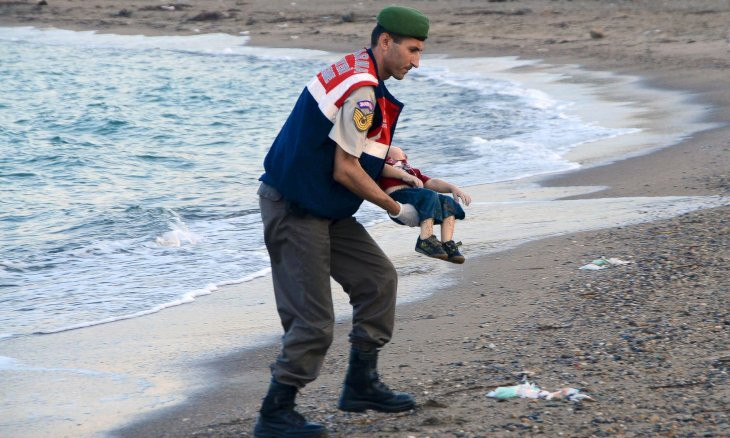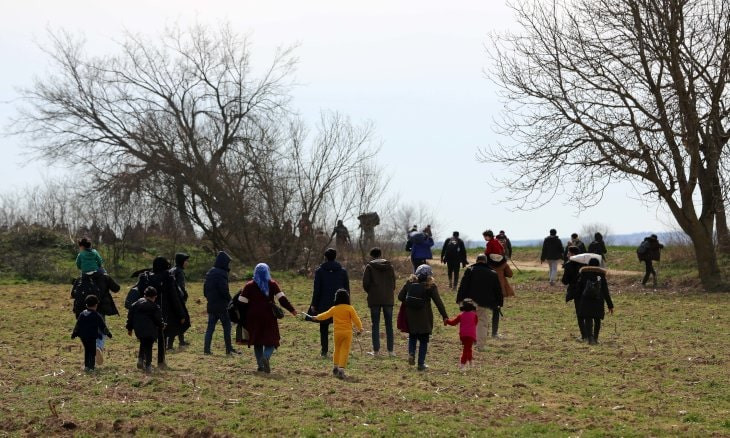Two Syrians die while attempting to cross border after Turkey opens frontier
Turkish security sources told Reuters that a Syrian refugee was shot dead by Greek border police on March 2, as he was trying to cross Turkey's western border -- a claim denied by Athens. Separately, the Greek coast guard said that one child died after being pulled from the seat when a boat capsized off the Greek island of Lesbos.
Duvar English / Reuters
A Syrian refugee seeking to cross from Turkey into Greece died from injuries on March 2 after Greek security forces intervened to prevent the passage of refugees gathered on the border, two Turkish security sources told Reuters, a claim denied by Athens.
BBC journalist Mughira Al Sharif also tweeted about the incident saying that the refugee was named Ahmet Abu Emad and he was shot at 9.07 a.m. near Turkey's İpsala border gate with Greece.
"Syrian refugee Ahmed Abu Emad, from Aleppo, killed today by the Greek Border Guards while trying to cross into Greece along with hundreds of refugees. He was shot in his throat at 09:07 am near #İpsala. His body was taken to Turkey," the BBC journalist wrote.
A Greek government spokesman said a video circulating on social media showing a young man with wounds to the head laid out on the ground was "fake news".
"We call upon everyone to use caution when reporting news that furthers Turkish propaganda," spokesman Stelios Petsas said on Twitter.
Video showing fatality on Greek-Turkish border is fake news. We call upon everyone to use caution when reporting news that furthers Turkish propaganda. #fakenews #fakeTurkishPropaganda
— Stelios Petsas (@SteliosPetsas) March 2, 2020
Separately, a child died after being pulled from the seat when a boat capsized off the Greek island of Lesbos, Greek officials said.
 Turkish think tank warns against possible cases of Alan Kurdi if refugee crossings increase
Turkish think tank warns against possible cases of Alan Kurdi if refugee crossings increaseMore than 10,000 migrants, mostly from Syria, other Middle Eastern states and Afghanistan, have reached Turkey's land borders with EU states Greece and Bulgaria since Ankara said last week it would stop keeping them on its territory.
Turkey, which is home to 3.7 million Syrian refugees and has another million on its doorstep from a new surge of fighting, said last week it would stop enforcing a 2016 agreement that had prevented migrants from reaching the EU.
Greek officials accused Turkey of orchestrating a coordinated effort to drive migrants across the frontier.
"This movement is guided and encouraged by Turkey," Greek government spokesman Stelios Petsas told reporters after a national security meeting in Athens. He called the surge of migrants at the border "an active, serious, severe and asymmetrical threat to the national security of the country."
Turkey's announcement last week threatens to reverse an agreement that halted Western Europe's biggest wave of migration since World War Two, the 2015-2016 crisis when 4,000 people drowned in Aegean and more than a million reached Greece.
The Greek coast guard said the boat which capsized off Lesbos early on March 2 had been escorted there by a Turkish vessel. Forty-six people were rescued and two children taken to hospital, one of whom could not be revived.
'This is an invasion'
Another dinghy with about 30 Afghans arrived on Lesbos early in the morning, a Reuters journalist reported from the island. Thirty-two others were rescued in the seas off Farmakonissi, a small island close to Turkey, the coast guard said.
"This is an invasion," Development Minister Adonis Georgiadis told Skai TV on March 2.
Late on March 1, Greek Prime Minister Kyriakos Mitsotakis tweeted that Greece was determined to protect its borders and warned migrants not to attempt to cross as security was increased to the maximum. He is expected to visit the border on March 3 with Charles Michel, chairman of EU leadership summits.
 Greece, Bulgaria strengthen border control as Turkey clears crossings for migrants
Greece, Bulgaria strengthen border control as Turkey clears crossings for migrantsClashes between police and migrants broke out on Feb. 29 and March 1 at the land border, and riot police used teargas to repel hundreds of migrants on the Turkish side.
Under a 2016 EU agreement with Turkey, Ankara agreed to stop migrants from crossing into the EU and accept most of them back if they did cross, effectively ending a crisis which toppled several EU governments and fuelled the rise of the far right.
In return, the EU offered funds. But Turkey says the arrangement is in jeopardy with a new wave of Syrian refugees on its southern border, driven there by an escalation of fighting since December. Last week, at least 33 Turkish troops sent to Syria to monitor a crumbling ceasefire were killed in the Turkish army's worst attack in nearly 30 years.
The 2016 agreement halted most crossings between Greece and Turkey, although there are more than 40,000 migrants on the Aegean islands in severely overcrowded camps.
